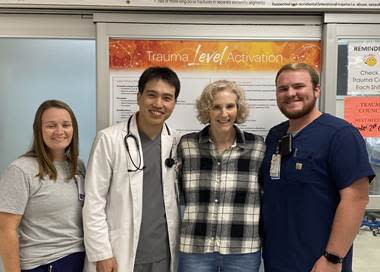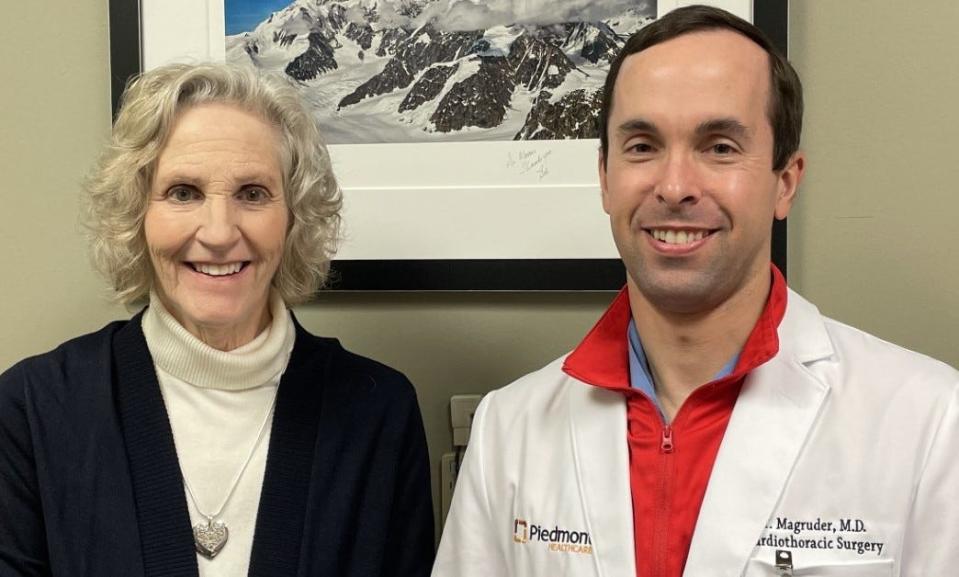American Heart Month: Rare condition nearly cost Monroe woman her life; saved by Athens surgeon

February is American Heart Month and Monroe resident Julie Koehler can celebrate this year after doctors at Piedmont Walton and Piedmont Athens Regional teamed up last summer to save her life after a serious heart condition made it impossible for doctors to check her blood pressure.
Koehler, who has had her share of heart issues over the last 15 years, was at her home in August when she felt tremendous pains in her chest, causing her husband Jeff to call 911 to take her to Piedmont Walton. When she arrived at the emergency room, nurses were unable to determine her blood pressure and could not provide any pain medication.
“I screamed for more than two hours asking for something for the pain because I can’t even describe how bad the pain was,” said the Wisconsin native. “But they couldn’t give me anything because they couldn’t take my blood pressure. ... I’m covered up in about 11 or 12 or those heated blankets in the middle of summer and I pulled the covers back and my feet and legs and fingertips were turning blue.”
'No stopping them': New Joro spider study at UGA shows spider adapts easy to urban life and is on the move
It was feared that Koehler had suffered a torn aortic aneurysm, and she was transferred via ambulance to Piedmont Athens Regional, where wires were inserted in her wrists to finally obtain a blood pressure reading. Koehler was then rushed into the operating room and spoke briefly with Dr. Trent Magruder, a cardiothoracic surgeon with the Piedmont Heart Institute Athens.
That’s the last thing she remembered until she woke up several hours later in the cardiac intensive care unit.
“The next morning, I woke up and that’s when I met Dr. Magruder and he said, ‘You shouldn’t be here,’” recalled Koehler. “… For two or three days he would come in in the morning and said, ‘You were lucky. You were in complete shock. I didn’t think I was going to get you to surgery and I didn’t think you were going to make it through surgery.’”
In the emergency room, Magruder determined that Koehler had cardiac tamponade, which means fluid filled the protective sac around her heart called the pericardium. It is not only painful but potentially fatal.
“She was bleeding into the space for her pericardium,” said Magruder. “In most mammals, your heart is inside of a sac called a pericardium, and it can’t expand very much. If you get in a situation where you start bleeding somewhere on your heart, that blood is outside of your heart but inside of the sac. The fluid accumulates in that space and compresses the heart, which causes blood pressure to drop and will kill you if it progresses.”

Once Magruder drained the blood from the sac, Koehler’s blood pressure increased by some 40 points.
Koehler wound up spending more than a week in the hospital and said in the days after the operation she learned how close she came to dying.
“I said, ‘God, please, not tonight. Don’t take me tonight,’” she said. “And as the days progressed in the hospital and I met the doctors I felt like it was God’s story. He placed these people in my life and all of this was supposed to happen this way."
Magruder said that the situation may have been caused by a device Koehler had implanted in her heart’s left atrial appendage a couple of months earlier to reduce the risk of blood clots.
“Fortunately, she was still sort of with it and talking to us when she got here, so she was OK, but it’s not the kind of thing you wait on,” said Magruder.
Koehler said she’s doing fine now and has resumed the 2-mile walks she was taking before the procedure. She’s now seeing cardiovascular doctors and said she’s feeling better every day.
“My body kind of adjusted to the situation,” she said. “It’s been a journey to this point.”
For more information on American Heart Month, visit www.cdc.gov/heartdisease/american_heart_month.htm.
This article originally appeared on Augusta Chronicle: Julie Koehler had a rare heart condition that was caught in time

